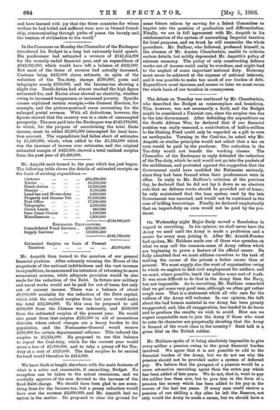The debate on Tuesday was continued by Mr. Chamberlain, who
described the Budget as commonplace and humdrum. This, however, was not necessarily a fault, and the Budget might be considered a Unionist one, since the surplus was due to the late Government. After defending the expenditure on the South African War, he declared that if our financial position was really unsound, a contribution of half-a-million to the Sinking Fund could only be regarded as a pill to cure an earthquake. Turning to the Coal-tax, he asked why Mi. Asquith on similar principles would not admit that a tax on corn would be paid by the producer. The reduction in the Tea-duty would not benefit the working classes. The Chancellor of the Exchequer in reply defended the reduction of the Tea-duty, which he said would not go into the pockets of the middleman, and protested against the suggestion that the Government could have modified the Estimates seriously, since they had been framed when their predecessors were in office. In reply to Mr. Balfour's criticism of the previous day, he declared that he did not lay it down as an absolute rule that no defence works should be provided out of loans ; he only maintained that the loan system used by the late Government was unsound, and would not be continued in the case of trifling borrowings. Finally, he declared emphatically that an import-duty on corn would not be paid by the pro- ducer.








































 Previous page
Previous page